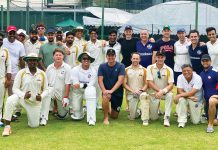NATURE PROTECTORS
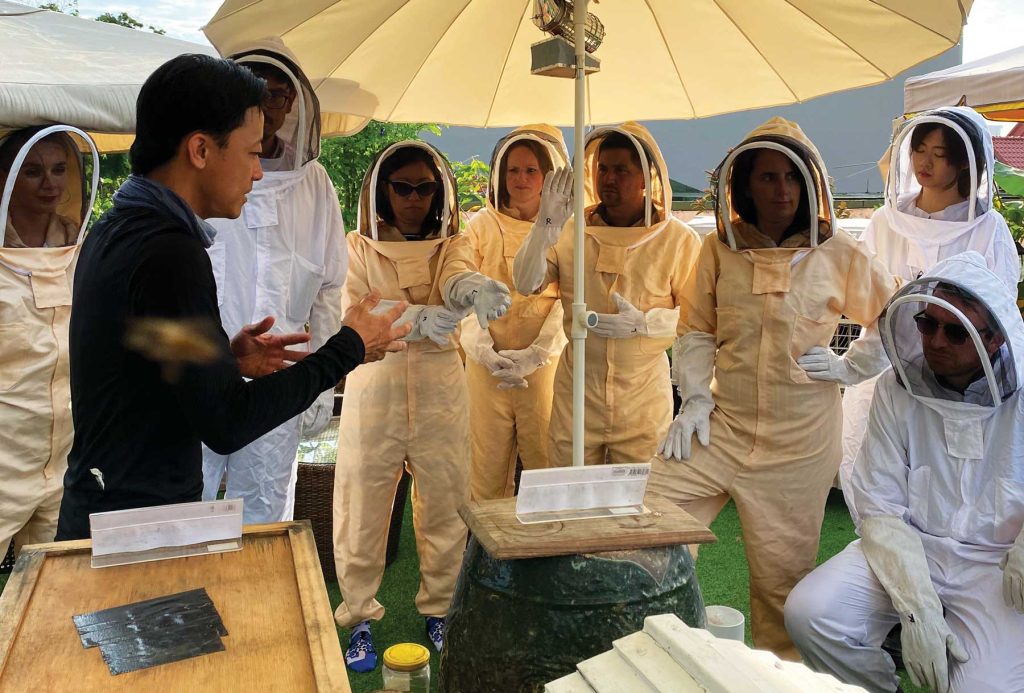
Clarence Chua is the founder of The Sundowner, a three-storey conserved shophouse in Siglap, featuring a backyard pizza place, bar, bee-keeping facilities and a rooftop farm. The green-loving team run around 20 nature-based and F&B experiences.
“I’ve always loved animals and nature. Growing up in Singapore, my family frequently embarked on outdoor adventures; we trekked and cycled in parks and forests here and overseas. I was the one catching spiders and scorpions. My work is a natural extension of my childhood passion!
The Sundowner is a place like no other. We started in 2019 with the Rooftop Farm Experience. It caught on quickly, so we kept ideating and creating new spaces and workshops. Today we host small groups in our garden setting comprising Farm Tours, Craft Workshops and Chillout Sessions, but make them fun, experiential, and Instagrammable. Our offerings come with an X-factor, for example, the restaurants next to us serve pizza, but we teach our guests how to make one from scratch, harvesting garnish from our garden. We don’t actually grow a large quantity of crops for commercial use. Unlike other farms, our focus is not output, but education. We hope to inspire others to understand and care for the world around them.
Feed the bees
Our other star attraction is our bees. Participants can don a suit, feed and inspect bee hives, and even harvest honey with the safety of a trained beekeeper. This began when we were moving an old shed to The Sundowner’s rooftop and found a nest of bees inside it. I already knew bees shouldn’t be killed, but as we ran out of time to call professionals to help us, we decided to try to shift the bees ourselves. (Don’t do this at home, kids!). We didn’t have the correct equipment but it turned out to be an exciting adventure, and we became hooked on trying to raise bees.
Early on, the bee-keeping was self-taught and trial and error. I was devastated during my first few attempts when we made mistakes and the bees kept flying away. It was difficult to find mentors in Singapore. We discovered there were only two other beekeepers on the island so we became the third, and youngest! I learned from online videos and in time I did training courses with an experienced beekeeper in Malaysia. I’ve also discovered that the best way to soothe a bee sting is to suck out the venom asap, or to use “Bug Bite Thing” (bugbitething.com). It works for mosquito bites too.
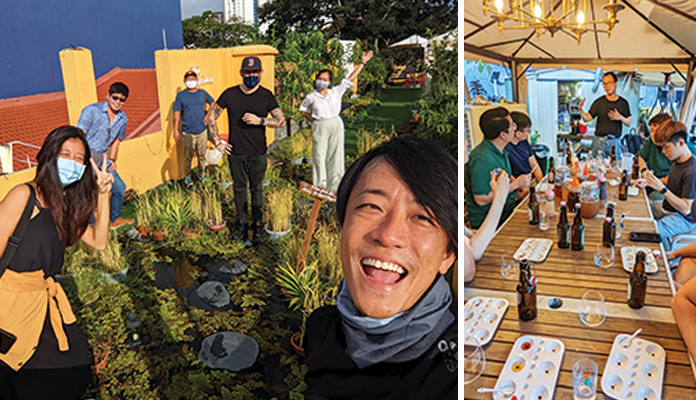
Food waste
People bandy ‘sustainability’ around, not really knowing what it means. To us at The Sundowner, sustainability should be about growing your business in line with mitigating the effects on the environment. This means that everything you do should consider whether it harms nature and if it does, then slow it down. But this is just the talk, and growth continues unabated in the face of, and causing, a dying world. The future doesn’t look good. 2023 was the hottest year on record and we’re all aware of the intensifying heat in 2024 – and this is just global warming.
I like to think that as a business we’re going one step further: the existence of our rooftop garden itself does good for nature. It was previously blank concrete but is now fully covered in greenery and houses 50,000 bees at any one time. The green cover reduces the urban island heat effect, while the bees help to pollinate plants. We also have a strong composting programme where none of our food waste gets thrown away. Our home kitchen supplies all the greens to make healthy heaps of compost which fertilises our plants, while roasted cacao nibs for example, are used as mulch for planting beds. Besides the bees, we also rear ants and worms in enclosures, which we harvest to enrich the soil. These form the backbone of our Bees Ants Worms experiences, which is a hit with children.
Our passion is showing people the provenance of things, like where does stuff come from. If people understand that crops come from the soil, and soil health and pollination by bees is important for a good harvest, they will likely start to take care of the environment around them.”
thesundownersg.com
@thesundownersg
OCEAN LOVERS
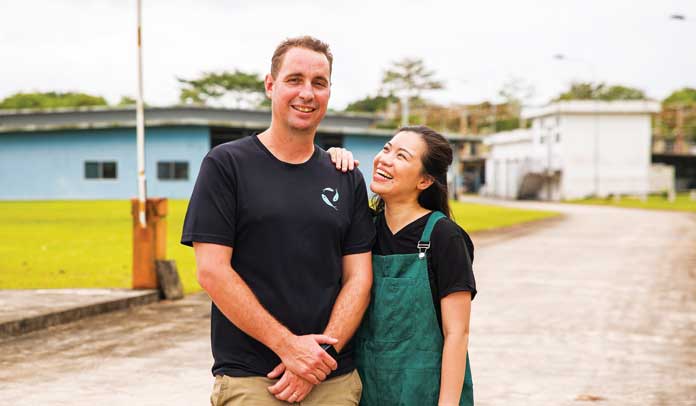
Husband-and-wife team Singaporean Victoria Yoong and Kane Mcguinn from Sunshine Coast, Australia are the founders of Atlas Aquaculture, Singapore and the world’s first land-based sustainable fish farm.
“Kane and I met in 2011 when we were both working on the building of the SEA Aquarium on Sentosa. I was part of the project management team and Kane was one of the aquarium designers.
We started discussing food security and sustainable fish farming in 2019. While fish farms can provide an alternative to wild-caught fish, the model itself presents challenges. For example, there are more than one hundred sea-based fish farms in Singapore, but less than 10 are land-based. For sea-based farms, oil spills, algae bloom, and low oxygen levels in the water means that any trucked-in seawater to kelongs or cages can be polluted. Kane and I wanted to build a self-sufficient system that didn’t require sea water to be carted in on a regular basis. We wanted to utilise sustainable materials and technology to reduce chemicals in the fish farming process.
It wasn’t until 2020 that we put our ideas into practice – and then Covid hit! Due to lockdown restrictions, Kane literally spent the pandemic building the farm in the Sungei Tengah countryside from scratch. Looking back, this was the least challenging part of our sustainable business journey! There was a lot of bureaucratic red tape to get through, and it took a very long time to get our various licenses. The fish farming industry in Singapore is traditional, with practices being passed down through generations, so fresh ideas are not readily welcomed. It took almost two years for Atlas Aquaculture to get up and running. Unfortunately, there needs to be a bigger understanding of new concepts.
Recycle & reuse
Today, our site covers 2.1 hectares, we have 16 staff, and we farm various Grouper, Threadfin, Snapper, Tiger Prawns, Barramundi, and more.

We stick to a ‘harvesting methodology’ so no part of the fish goes to waste – in Singapore the heads and tails are popular in collagen soups. We make our limited resources work through a closed-loop water recycling system we designed ourselves. The system allows us to recycle and reuse over 95% of our water (5% evaporates due to our crazy weather), while keeping our fish healthy. We also use solar panels throughout the farm, and every morning we carry out specific transfer planning to reduce mileage on our deliveries around the island.
We try to work out how to do better for the planet every day. It’s not easy – our packaging is still plastic. As for inspiration for new ideas, Kane listens to lots of podcasts (Australian broadcaster Dr Karl is a favourite!) and goes on a lot of walks!
We started with 50+ tonnes of fish and by the end of 2024 we’re hoping to scale up to 450 tonnes, supplying to the likes of Jumbo Seafood, Resorts World Sentosa, and Les Amis group. As a Singaporean, I look at Kane’s upbringing in Australia, living a true farm-to-table lifestyle, and hope Singapore can take note. We’re currently working with projects in Lombok and Sarawak, and hope to have a footprint in Australia soon.”
atlasaquaculture.com
atlasaquaculturesg
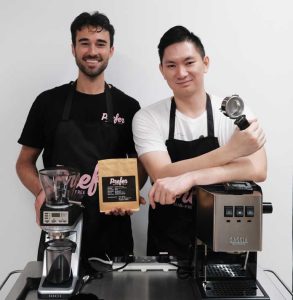
COFFEE CONNOISSEURS
Jake Berber (CEO) and DJ Tan (CTO) launched Prefer, a bean-free coffee brand (yes, really!) combining bread, soy and barley in Singapore earlier this year.
Jake: “DJ and I were connected through Entrepreneur First in Singapore, which is a platform that identifies and matches budding entrepreneurs with co-founders who would complement each other’s skills.
We knew we wanted to work on food tech and figured that fermentation is the key to creating sustainable foods that could be scaled. We also knew that to create climate impact at scale, it was going to take more than just changing our habits. We picked coffee as it’s a commodity that’s both threatened by and contributing to climate change – there will likely be a 50% decrease in farmlands by 2050. Coffee is getting expensive and this will continue over the coming decades. We wanted to offer consumers a sustainable alternative that’s delicious, affordable, and can be easily adapted into current business operations.
The biggest challenge was – and is – that nobody has done this with coffee before. We started in 2022, working from DJ’s kitchen, but after securing funds we moved into a lab-space in Biopolis. We had to screen hundreds of potential feedstocks and microbes to identify ones that could replicate coffee flavours – we must have tried at least one hundred formulations and iterations. Our logbooks are packed with batch codes and recipes!”

DJ: “Eventually we got our breakthrough which is our coffee formula today. We ferment bread, soy and barley to create coffee flavours, then we roast and grind the mixture to be used in your everyday lattes, americanos, or espresso martinis. For the barista and consumer, it’s the same experience of making and drinking coffee.
There may be a platonic ideal of coffee, but to me, good coffee is one that should generally have an enticing aroma, a balanced harmony of tastes, bitterness, acidity, sweetness, and a smooth mouthfeel. Through Prefer, we just have a more sustainable and reliable way of making it.
Eventually, Jake and I hope to create a range of flavours and beverages that are also threatened by climate change such as cacao, vanilla, hazelnut and so on. Since we just secured US$2 million in funding, the plan is to use this to grow our production capabilities and work on expanding our products in the wider Southeast Asia region, starting with the Philippines.”
Prefer is stocked at various locations across Singapore including Lau Pa Sat and select SaladStop! branches.






